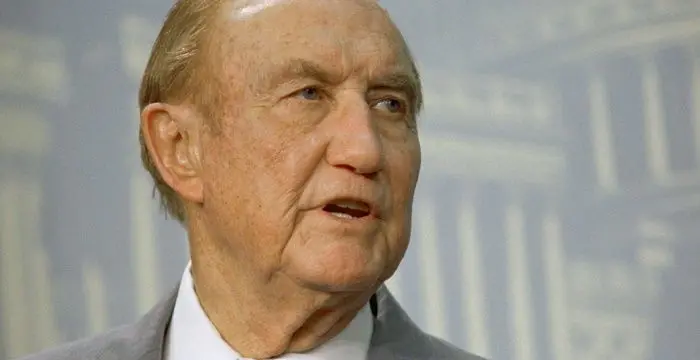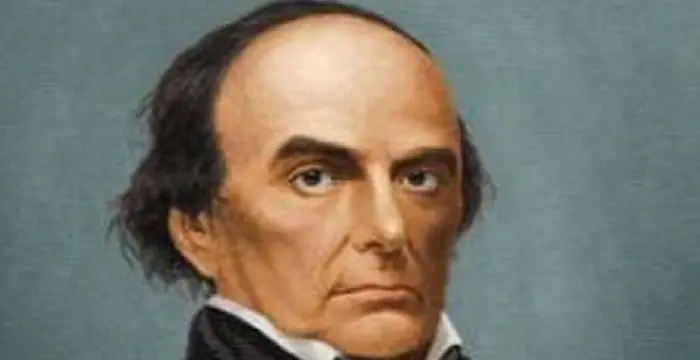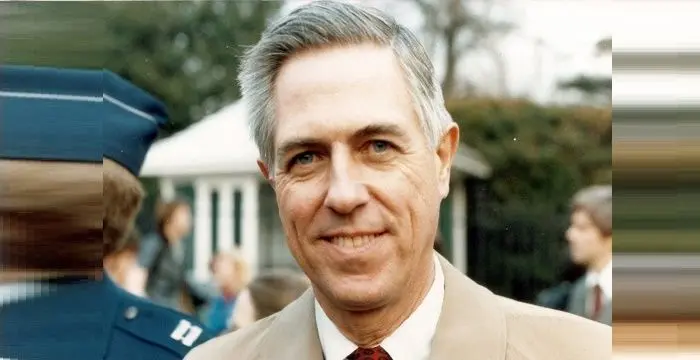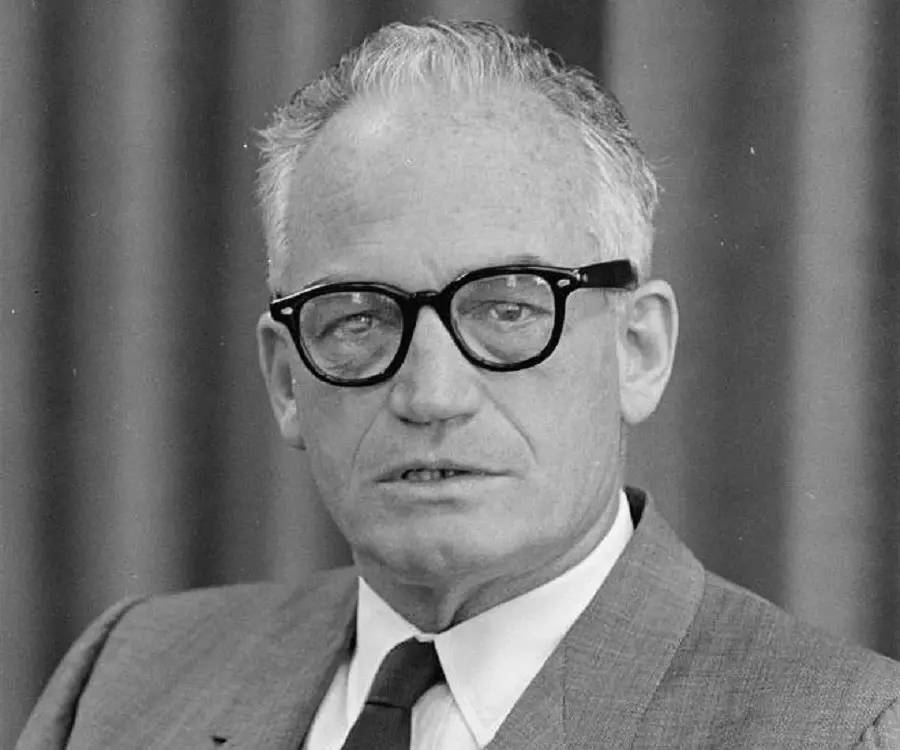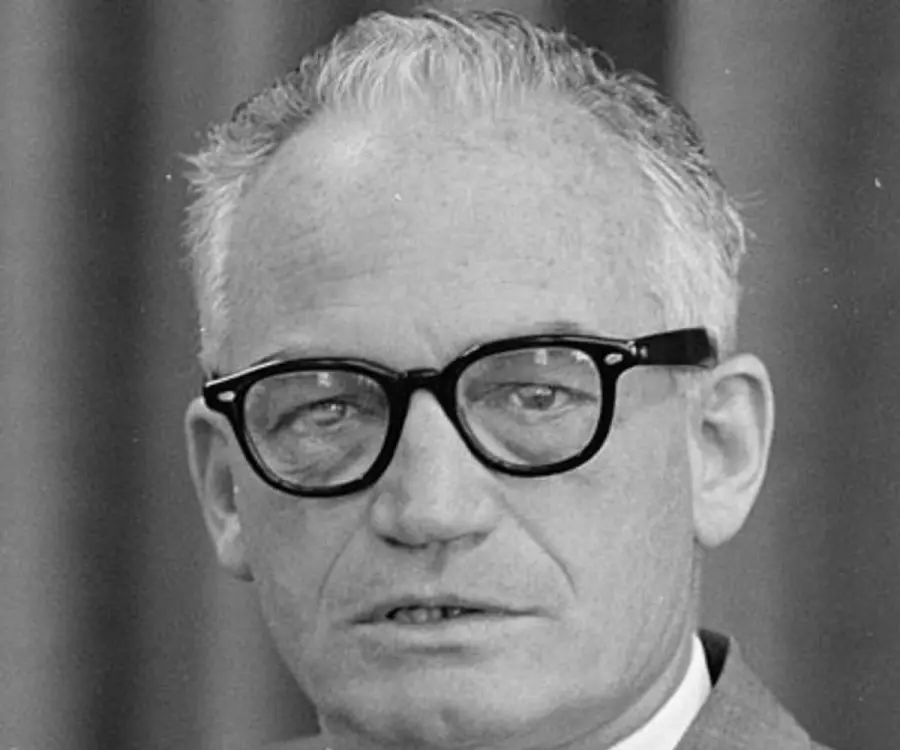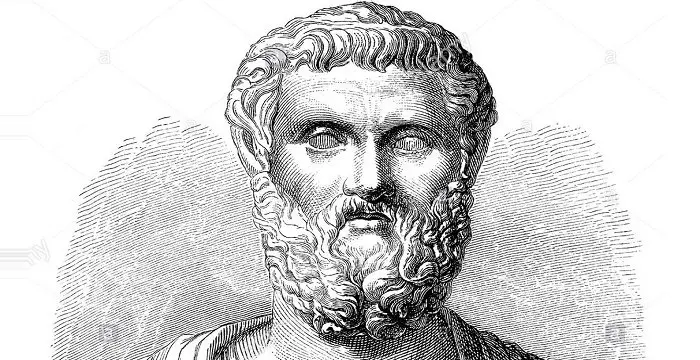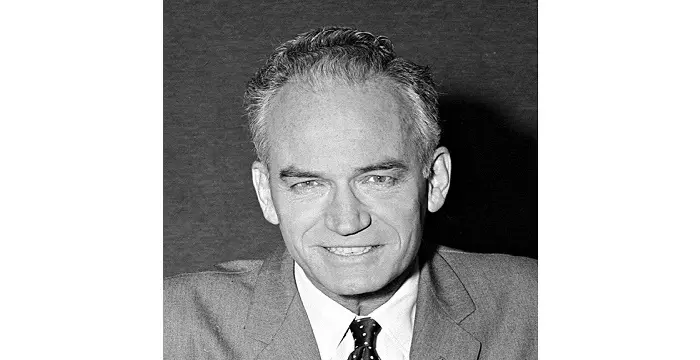
Barry Morris Goldwater - Former United States Senator, Facts and Childhood
Barry Morris Goldwater's Personal Details
Barry Goldwater was a five-term U.S
| Information | Detail |
|---|---|
| Birthday | January 2, 1909 |
| Died on | May 29, 1998 |
| Nationality | American |
| Famous | Republicans, University Of Arizona, Leaders, Political Leaders, Former United States Senator |
| Ideologies | Republicans |
| City/State | Arizona |
| Spouses | Margaret Johnson (m. 1934–1985), Susan Shaffer Wechsler (m. 1992–1998) |
| Known as | Barry Goldwater |
| Childrens | Barry Morris Goldwater Jr., Joanne, Michael, Peggy Jr. |
| Universities |
|
| Notable Alumnis |
|
| Birth Place | Phoenix |
| Political Ideology | Republican Party |
| Religion | Anglican/Episcopalian |
| Gender | Male |
| Father | Baron M. Goldwater |
| Mother | Hattie Josephine Williams |
| Sun Sign | Capricorn |
| Born in | Phoenix |
| Famous as | Former United States Senator |
| Died at Age | 89 |
// Famous Former United States Senator
Strom Thurmond
Strom Thurmond was an American politician, who represented the state of South Carolina in the United States senate for 48 years.
Daniel Webster
Daniel Webster was a prominent senator from Massachusetts. This biography of Daniel Webster provides detail information about his profile, childhood, life & timeline.
James L. Buckley
James L. Buckley is a retired American judge and senator. This biography offers all the information about his, childhood, life, works, achievements and timeline.
Barry Morris Goldwater's photo
Who is Barry Morris Goldwater?
As a youth, Barry Goldwater steered his family mercantile business to success, little did he know that in the future, he would dominate the U.S. Senate for nearly three decades of his life. He would go on to permanently alter and govern conservative American political affairs and would grow to become one of the most scorned yet prominent leaders of the 20th century. A college-drop out, Goldwater’s tête-à-tête with patriotism began when he joined the United States Army Air Forces where he was promoted to major general in the Air Force Reserve. His transition from 37 years of military service into the senate, commenced with a chance election into the local City Council. Then on, he began winning one gubernatorial campaign after another, launching an uprising within the Republican Party. A strong anti-communist, he soon lost the elections to Democrat, Lyndon B. Johnson, due to his warmongering and old-fashioned ideologies, for which he was ridiculed for years. Nevertheless, he elected and re-elected to the US Senate and enforced his belligerent commands over foreign policy, arms exchange, defense policies and even influenced the resignation of former President Richard Nixon. He has authored a number of publications in his lifetime including, ‘The Conscience of a Conservative’ and ‘No Apologies’. Scroll further for more.
// Famous Leaders
Edi Rama
Edi Rama is the current Prime Minister of Albania. Check out this biography to know about his childhood, life, achievements, works & timeline.
Tecumseh
Tecumseh was a Native American leader of the Shawnee clan. This biography profiles his childhood, life and timeline.
Khalifa bin Zayed Al Nahyan
Sheikh Khalifa bin Zayed Al Nahyan is the current President of the United Arab Emirates (UAE). Check out this biography to know about his birthday, childhood, family life, achievements and fun facts about him.
Childhood & Early Life
Barry Morris Goldwater was born into a wealthy Episcopal household, to Baron M. Goldwater and Hattie Josephine Williams, who were the owners of a large chain of departmental stores around the United States called, ‘Goldwater’s’.
He studied at Staunton Military Academy and then enrolled in the University of Arizona for a year. Following the death of his father in 1930, young Barry took over the family business and promoted innovative, reformist practices that changed the future of the company for the better.
Career
He grew tired and wary of handling the family business and at the onset of World War II he enlisted in the United States Army Air Forces, where he rose rapidly through the ranks, from command pilot to Major General.
He served the army for nearly 37 years and was also instrumental in the creation of the ‘United States Air Force Academy’ and the ‘Arizona Air National Guard’.
After he retired from the Army as Air Force Major General, he became active in local politics in Phoenix, in 1949.
In 1952, he was elected to the US Senate, defeating Ernest McFarland. Six years later, he defeated McFarland again and retired from the US Senate in 1964 to campaign for presidency.
In 1960, he authored the book, ‘The Conscience of a Conservative’, which became a significant publication in the political arena of America.
In 1964, he opposed the ‘Civil Rights Act of 1964’ and justified his opposition by stating that he believed, the federal government was being intrusive in the affairs of each individual state and that each state had its right to its own laws and independence.
Thus, he ran a conservative campaign against the federal government, which won him the support of conservatives in southern states including Georgia and South Carolina.
However, his campaign against the ‘Civil Rights Act’ proved to be devastating around the other states in America, which led to his landslide defeat the same year.
In 1964, he contested for the Republican Party’s presidential nomination, where he defeated Nelson Rockefeller by a small margin in the primary round.
However, a number of liberal Republicans opposed his nomination because they believed that his aggressive, anti-Communist stance against Russia might pave way for a nuclear war. This subsequently led to a fall in the percentage of votes, which led him losing the elections to Lyndon Johnson, who became the President.
Despite his loss, he was elected as a Senator to the US Senate in 1968, replacing Carl Hayden.
He was re-elected to the Senate in 1974, during which time he urged Nixon to resign from presidency in the wake of the ‘Watergate Scandal’.
In 1980, he was elected to the Senate once again, before which he had planned to retire. However he decided to contest one last time and this time round, the re-election seemed tougher, because the social fabric had changed in Arizona and not many new voters were agreed to his archaic views and policies. Despite the hardships, he was re-elected to the Senate.
On October 30, 1984, he introduced the Cable Communications Act, which established a number of regulations on cable communications and promoted competition and deregulation in the cable industry.
In 1985, he was appointed as the Chairman of the Senate Committee on Armed Services; a position he served till his retirement.
While serving his final term as a senator, he signed the ‘Goldwater-Nichols Department of Defense Reorganization Act’, which brought about a number of sweeping changes in the United States Military and the Department of Defense.
He retired in 1987 and during the time of his retirement, he was considered one of the most respectable, influential figures in the US senate.
Following his retirement, he made a number of controversial statements pertaining to the ‘Whitewater Scandal’ and the ban on homosexuals in the military, which distanced many of his own supporters from him. He also played an active part in legalizing ‘medical marijuana’.
Major Works
‘The Conscience of a Conservative’, published in 1960, became an instant hit with the political circles in the US which covers a wide range of topics ranging from Goldwater’s conservative ideologies to civil rights and social welfare programs. The book continues to stir modern-day radical commentary and has also inspired other publications that have drawn on the themes of his book including, ‘The Conscience of a Liberal’ and ‘Conservatives without Conscience’.
Awards & Achievements
He was honored with the ‘Presidential Medal of Freedom’ by President Ronald Reagan on May 12, 1986.
He was awarded the ‘Langley Gold Medal’ in 1987 by the Smithsonian Institution.
He was presented the ‘James Madison Award for Distinguished Public Service’ by the American Whig-Cliosophic Society from Princeton University, in 1988.
Personal Life & Legacy
He was a radio operator in the early years of his life and played an active part in helping those in the army communicate with their loved ones back home during the Vietnam War.
He married Margaret Johnson in 1934, with whom he had four children; Joanne, Barry, Michael and Peggy. However, she passed away in 1985.
In 1992, he married Susan Wechsler, who was 32 years younger than him.
He was also an avid photographer and showed great interest in the study of UFO’s.
He passed away after suffering a stroke at the age of 89.
Today, ‘The Barry M. Goldwater Scholarship’ is presented to college students who wish to pursue careers in the fields of mathematics, science and engineering.
A number of buildings and monuments have been named in his honor including, ‘The Barry M. Goldwater Terminal’, ‘The Barry Goldwater Air Force Academy Visitor Center’ and the ‘Barry Goldwater High School’ in Phoenix.
Trivia
This prominent US Senator collected 437 Kachina dolls in his lifetime, which was later given to the Heard Museum in Phoenix, in 1969.
// Famous University Of Arizona
Geraldo Rivera
Geraldo Rivera is an American reporter, author, attorney, and talk show host. Check out this biography to know about his birthday, childhood, family life, achievements and fun facts about him.
Kristen Wiig
Kristen Wiig is a popular American comedienne, actress, producer and writer. Check out this biography to know about his childhood, life, achievements, works & timeline.
Dexter Keaton
Dexter Keaton is the adopted daughter of Academy Award winning actress, Diane Keaton. Check out this biography to know about her birthday, childhood, family life, achievements and fun facts about her.
Barry Morris Goldwater biography timelines
- // 2nd Jan 1909Barry Morris Goldwater was born into a wealthy Episcopal household, to Baron M. Goldwater and Hattie Josephine Williams, who were the owners of a large chain of departmental stores around the United States called, ‘Goldwater’s’.
- // 1930He studied at Staunton Military Academy and then enrolled in the University of Arizona for a year. Following the death of his father in 1930, young Barry took over the family business and promoted innovative, reformist practices that changed the future of the company for the better.
- // 1934 To 1985He married Margaret Johnson in 1934, with whom he had four children; Joanne, Barry, Michael and Peggy. However, she passed away in 1985.
- // 1949After he retired from the Army as Air Force Major General, he became active in local politics in Phoenix, in 1949.
- // 1952In 1952, he was elected to the US Senate, defeating Ernest McFarland. Six years later, he defeated McFarland again and retired from the US Senate in 1964 to campaign for presidency.
- // 1960In 1960, he authored the book, ‘The Conscience of a Conservative’, which became a significant publication in the political arena of America.
- // 1964In 1964, he opposed the ‘Civil Rights Act of 1964’ and justified his opposition by stating that he believed, the federal government was being intrusive in the affairs of each individual state and that each state had its right to its own laws and independence.
- // 1964In 1964, he contested for the Republican Party’s presidential nomination, where he defeated Nelson Rockefeller by a small margin in the primary round.
- // 1968Despite his loss, he was elected as a Senator to the US Senate in 1968, replacing Carl Hayden.
- // 1969This prominent US Senator collected 437 Kachina dolls in his lifetime, which was later given to the Heard Museum in Phoenix, in 1969.
- // 1974He was re-elected to the Senate in 1974, during which time he urged Nixon to resign from presidency in the wake of the ‘Watergate Scandal’.
- // 1980In 1980, he was elected to the Senate once again, before which he had planned to retire. However he decided to contest one last time and this time round, the re-election seemed tougher, because the social fabric had changed in Arizona and not many new voters were agreed to his archaic views and policies. Despite the hardships, he was re-elected to the Senate.
- // 30th Oct 1984On October 30, 1984, he introduced the Cable Communications Act, which established a number of regulations on cable communications and promoted competition and deregulation in the cable industry.
- // 1985In 1985, he was appointed as the Chairman of the Senate Committee on Armed Services; a position he served till his retirement.
- // 12th May 1986He was honored with the ‘Presidential Medal of Freedom’ by President Ronald Reagan on May 12, 1986.
- // 1987He retired in 1987 and during the time of his retirement, he was considered one of the most respectable, influential figures in the US senate.
- // 1987He was awarded the ‘Langley Gold Medal’ in 1987 by the Smithsonian Institution.
- // 1988He was presented the ‘James Madison Award for Distinguished Public Service’ by the American Whig-Cliosophic Society from Princeton University, in 1988.
- // 1992In 1992, he married Susan Wechsler, who was 32 years younger than him.
- // 29th May 1998He passed away after suffering a stroke at the age of 89.
// Famous Political Leaders
Edi Rama
Edi Rama is the current Prime Minister of Albania. Check out this biography to know about his childhood, life, achievements, works & timeline.
Khalifa bin Zayed Al Nahyan
Sheikh Khalifa bin Zayed Al Nahyan is the current President of the United Arab Emirates (UAE). Check out this biography to know about his birthday, childhood, family life, achievements and fun facts about him.
Leo Varadkar
Cam Leo Varadkar is the current Taoiseach—the Prime Minister—of the Republic of Ireland. Check out this biography to know about his childhood, family life, achievements and other facts about his life.
Strom Thurmond
Strom Thurmond was an American politician, who represented the state of South Carolina in the United States senate for 48 years.
Solon
Solon was an Athenian lawmaker, poet and politician. He is considered as one of the ‘Seven Wise Men’ in Greek culture. This biography provides detailed information about his childhood, life, career, works, achievements and timeline.
Mohammed bin Salman
Mohammed bin Salman is the Crown Prince of Saudi Arabia and the heir apparent to the throne. Check out this biography to know about his childhood, family life, achievements and other facts about him.
Barry Morris Goldwater's FAQ
What is Barry Morris Goldwater birthday?
Barry Morris Goldwater was born at 1909-01-02
When was Barry Morris Goldwater died?
Barry Morris Goldwater was died at 1998-05-29
Where was Barry Morris Goldwater died?
Barry Morris Goldwater was died in Paradise Valley
Which age was Barry Morris Goldwater died?
Barry Morris Goldwater was died at age 89
Where is Barry Morris Goldwater's birth place?
Barry Morris Goldwater was born in Phoenix
What is Barry Morris Goldwater nationalities?
Barry Morris Goldwater's nationalities is American
What is Barry Morris Goldwater ideologies?
Barry Morris Goldwater's ideologies is Republicans
Who is Barry Morris Goldwater spouses?
Barry Morris Goldwater's spouses is Margaret Johnson (m. 1934–1985), Susan Shaffer Wechsler (m. 1992–1998)
Who is Barry Morris Goldwater childrens?
Barry Morris Goldwater's childrens is Barry Morris Goldwater Jr., Joanne, Michael, Peggy Jr.
What was Barry Morris Goldwater universities?
Barry Morris Goldwater studied at University Of Arizona, Staunton Military Academy, University of Arizona
What was Barry Morris Goldwater notable alumnis?
Barry Morris Goldwater's notable alumnis is University Of Arizona
What is Barry Morris Goldwater's political ideology?
Barry Morris Goldwater's political ideology is Republican Party
What is Barry Morris Goldwater's religion?
Barry Morris Goldwater's religion is Anglican/Episcopalian
Who is Barry Morris Goldwater's father?
Barry Morris Goldwater's father is Baron M. Goldwater
Who is Barry Morris Goldwater's mother?
Barry Morris Goldwater's mother is Hattie Josephine Williams
What is Barry Morris Goldwater's sun sign?
Barry Morris Goldwater is Capricorn
How famous is Barry Morris Goldwater?
Barry Morris Goldwater is famouse as Former United States Senator
